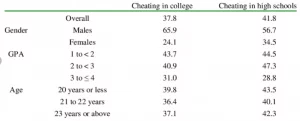A student cheating in exams is not something new. There is enough evidence that students practice this vice that has become a major challenge in colleges and universities.
Academic dishonesty is increasingly becoming common. Even though colleges have put in systematic measures to curb the vice, the reason why there is a rise in cheating has always been overlooked.
Whether it is an in-class or online examination, students have devised creative tactics to achieve their goal of cheating. It can be copying from another person, copying another test, using crib notes, or helping someone to write a test.
Exam cheating can be in different forms ranging from the purchase of term papers to paying another individual to do the exams on your behalf.
The repercussions involved in cheating are devastating and can have a negative impact on the academic life of a student.
There is the risk of academic suspension or even expulsion. According to academic experts, this implication will make it difficult for a student to enroll in another college.
How Many Students Cheat in College
The recent statistics and research about the number of students who cheat is simply shocking. Unlike in the past where only struggling students attempted exam cheating, above-average students are now attempting the vice.
In total, around 60% of students in most education institutions admit to having cheated in one way or the other at some point.
15% of students in a recent report admitted to having directly cheated or hired contract cheaters. In terms of exams, 30% of students admit to either cheating or witnessing others cheat.
In the past 30 years, 7 out of 10 test takers have all agreed that students in high school and college are cheating in exams.
The rising numbers have been attributed to the fact that cheating does not have the stigma or social disapproval as before.
Because of stiff competition for college admission, students are now more focused on the grades they will get and not good quality education.

Only 3 out of 10 students perceive cheating as a problem with majority of them unlikely to report exam cheaters when they discover.
In a 2013 student cheating report, about 15% of students admitted to cheating or took part in the act.
However, this number has significantly increased. Today, 75% of college students have been involved directly or indirectly in cheating.
This rising number is from students seeking justification in exam cheating. When they see their fellow students cheating, they feel disadvantaged.
The wide spread use of computers has also made it easier for cheaters to do download term papers and revise them before the exam day. Most of the areas where cheating is rampant are math and science subjects.
About 75% of college students who cheat in exams have confessed that they started or learned the act while in high school then later perfected it in college.
The urge to cheat usually starts as early as elementary or even middle school. When children finish their kindergarten and proceed to the next level, the pressure of getting good grades arises.
Teachers, administrators and parents mount pressure on students making them cheat in order to stay ahead of their contemporaries.
There are those who copy texts from assignments done by other students while other exam cheaters have admitted they plagiarize exam materials from internet sources. There are also a bigger number of students who prefer buying custom term papers online.
In addition to this, others perfect the act through the use of mobile devices during the exams while there are a small percentage of students who hire external helpers to do their online classes for them.
Why Students Cheat in College Exams
1. Inability to Manage their Time Properly
When a student runs out of time and is unable to cover all the topics given in a particular course, the likelihood of being unprepared for exams is high. In this case, they resort to academic dishonest to avoid failing the exams. Avoid this by practicing good time management skills.
2. Fear of Failing
Most students who take part in cheating usually feel they are unable to perform the task. Taking math tests, composing papers and computer coding are some of the tasks that can prompt a student to participate in academic dishonesty.
In addition, the pressure from parents and guardians for students to get good grades usually instill fear in students. Consequently, the have to get involved in academic cheating. To get the grades their parents have given them as a target.
3. Work Overload

There is a lot of stress involved in college studies.
An overload of homework assignments, research papers, and work issues coupled with relationship problems can cause a lot of stress to a student.
This will propel a student to use any means such as cheating in order to pass exams.
4. Peer Pressure
When you witness most of your friends and classmates cheating, the temptation to join them is high. When you watch your fellow students cheating and getting away with it, it is easy to compromise your academic integrity and join them.
What students don’t realize is that cheating is addictive. Once you take part in it for the first time, it becomes a habit in the subsequent exams and one ends becoming completely dishonest in all academic pursuits.
5. Unfair Examination Systems
There are bad education systems that have one final exam that defines the academic journey of a student. As such, even the society will be quick to judge a student based on the result they get from this final examination. Rightly so, learners become afraid of what will happen if they fail hence they opt to cheat in order to get good grades.
6. Technology
With the arrival of the internet, students find it difficult to fight the urge to cheat because it is easier to access information. Through search engines like Yahoo and Google, it has become easier for students to access custom made papers with plagiarism becoming the common factor in exam cheating.
Summary of Research Done on Student Cheating
Whether you call it academic misconduct or academic fraud, when a student participates in exams against the required norms of a school exam policy, the action is cheating. In a nutshell, 3 out of 5 college students have cheated in their exams at some stage of their academic journey.

Recent researches have revealed that about 15% of students start cheating as early as the first grade.
Furthermore, half of students who are in the middle schools are taking part in cheating.
The number rises as students progress to higher classes with 70% of high school students involving themselves in exam malpractices.
However, these statistics about the rate of cheating vary between different learning institutions depending on the anti-cheating measures put in place and the size of the school.
Researchers have also revealed that cheating in an online class is much easier than a face to face class. A large scale research conducted has revealed that developed countries such as Germany, the UK, Australia, Canada and USA have reported a 75% surge in cheating cases among university students.
The quality of education offered in a school, college or university can have a huge impact on a country, especially in its competition on the international front.
Nonetheless, the rise of cheating has adversely affected the quality of education learning institutions offer and the affected country will be unable to compete effectively on the world stage.
Even on a more negative side, students who get good grades through cheating will not be good decision makers in their respective careers. In most cases, the students usually feel everything can be achieved the easy way through shortcuts.
The truth remains that students who cheat are often unaware of the long term consequences they are likely to face in their future and general life.

Joseph is a freelance journalist and a part-time writer with a particular interest in the gig economy. He writes about schooling, college life, and changing trends in education. When not writing, Joseph is hiking or playing chess.
